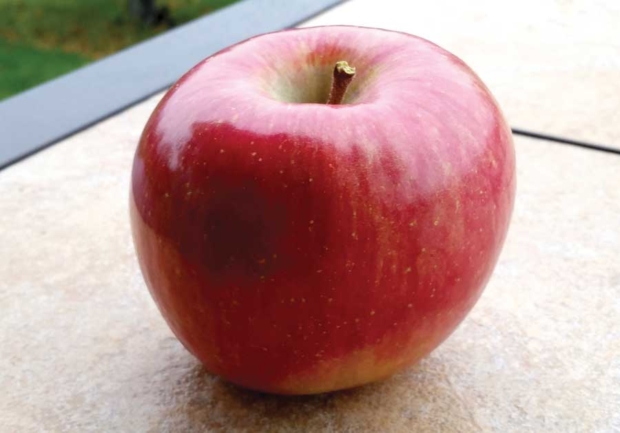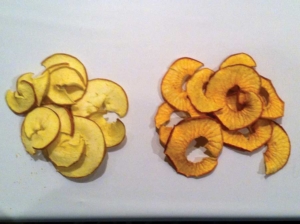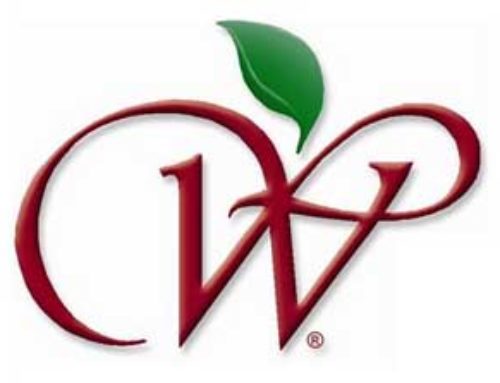
The Arctic Fuji apple is awaiting approval from the U.S. and Canadian governments. Meanwhile, Okanagan Specialty Fruits, the Canadian company that produces apple varieties that have been genetically modified to not turn brown, is expecting to harvest its first commercial crop of about 50 bins this year, all in Washington.
(Courtesy Okanagan Specialty Fruits)
After 20 years of development, a Canadian company is expecting its first commercial crop of genetically modified apples in 2016 while awaiting approval to forge ahead with its third and latest variety, Arctic Fuji.
Okanagan Specialty Fruits plans to harvest and pack about 50 bins of Arctic Golden Delicious apples and plant its first Arctic Granny Smith apples this year.
The Summerland, British Columbia, company develops and produces apples genetically modified to not turn brown when sliced.
Specialty Fruits received approval for Arctic Golden and Arctic Granny apples from food and plant health agencies in both countries early in 2015 and planted about 15 acres of Goldens in Washington, said Neal Carter, company president and founder.
Those trees will yield a small crop this fall, while the company plans to plant significantly more acreage of both varieties in 2016, mostly in Washington, with increasing quantities in the following years in other states and Canada.
The company will test market the first apples from this year in a few select stores, but as it ramps up production, it will distribute to a variety of locations in both the U.S. and Canada, Carter said.
Carter declined to say which growers, packers or retailers will be working with Arctic apples.
At the same time, the firm expects U.S. approval sometime this year of its latest variety, the Arctic Fuji, with Canadian approval to follow within another year.
Arctic Fuji
Specialty Fruits applied for U.S. deregulation for the Fuji on Dec. 31, 2015, in the form of an extension to the documents of previously approved varieties. The process should move faster than the original application, filed with the U.S. authorities in 2010 and the year after in Canada.
The U.S. Food and Drug Administration and the U.S. Department of Agriculture’s Animal and Plant Health Inspection Service have regulatory oversight of biotechnology in America. In Canada, the two agencies involved are Health Canada and the Canadian Food Inspection Agency.
Once approvals are in place, the company may propagate and market the apples as if there was nothing different about them.
“What that approval means is it’s treated like any other apple variety,” Carter said.

Arctic Fuji apple slices, left, resist browning more than conventional apple slices. (Courtesy Okanagan Specialty Fruits)
At its laboratory in Saskatoon, Saskatchewan, Specialty Fruits alters the DNA of apples to silence an enzyme that causes apple flesh to brown when exposed to oxygen, such as when it’s sliced or bitten.
Specialty Fruits plans to apply for approval for an Arctic Gala by the end of 2017, with other varieties to follow. The company also is seeking agreements to grow and market its Arctic apples in other countries, a lengthy process just as it is in North America.
“The regulatory thing is quite onerous no matter where you are in the world,” Carter said.
In Mexico, the company is seeking a food safety assessment to ship Arctic apples in the country and slice them there, he said, while a group of Australians is discussing growing the apples with the company’s representatives.
The company both plants its own orchards and contracts with outside growers. Either way, and no matter where the trees are planted, Okanagan Specialty Fruits will own the trees and apples, unlike the royalty arrangements that usually accompany club varieties, Carter said.
Such a structure will give Specialty Fruits more control to prevent cross-pollination and other co-mingling of conventional fruit, one of the biggest objections to the controversial genetic techniques, Carter said.
So far, the company has contracted with two large, well-established growers, one in Washington, one in the Eastern U.S. Carter declined to specify the locations.
Okanagan Specialty Fruits was purchased in April 2015 by Intrexon Corp., a biotechnology company based in Germantown, Maryland. •
– by Ross Courtney






Thanks a lot for doing this completely useless modification to a perfectly good fruit, we will no longer be buying apples, since they are now being modified and of course not labelled. We like our Apples to tell us when they are no longer fresh, we don’t particularly want to eat fruit that is no longer fresh but looks fresh. I guess these apples will be the Twinkies of the fruit world, congratulations.
Buy organic apples. GM technology is not allowed in organic agriculture.
The people don’t want this toxic thing it’s not how God made this earth to be
Apple genes controlling apple genes in apples. Can’t wait to buy these new apples.
Wonder why we need this… Just lust for ever more dollars for shareholders… Only time tell if we massively interfere with nature what will our fate be… Despite the corp resonsibility talk there is not if short sightedness which is literally buyingbthe moral high ground by conditioning the next generation to feel normal about all this.
Rainer, browning is not an indication of whether food is fresh or not, but rather an oxidative process. Genetic modification processes to reduce browning or bruising in food will help prevent needless food waste. With abln estimated 20-30% food waste currently, these will act as another tool to reduce waste to help meet food security in a rapidly growing global population.
This is depressing news.
Boycott science-fiction apples.
Boycott science-fiction applesauce.
Boycott science-fiction apple-pie.
Boycott science-fiction apple-juice.
Boycott science fiction apple-streudel.
Boycott all the works of science-fiction science and science-fiction farming.
Boycott all the institutions of higher learning where these works are devised.
Boycott all the institutions of commerce where these works are offered in trade.
Speak up! Speak out! Spread the word!
Tell your friends to do the same.
That’s why you can sprinkle the apple slices and any other fruit of vegetable that turns brown quickly with LEMON JUICE !!
Mixing apples and lemons? OMG, that would never happen in nature!
This is farankenfood at best and a way to steal and patent mother nature. This steals grom the poor and gives to the rich. There is already way more than enough food. Scarcity is a lie. Money is the reason for starvation. Gmo make it worse.
[…] to Good Fruit Grower, a publication from the Washington State Fruit Commission, after 20 years of development, […]
How horrible. The chemicals in food that make it somehow “better to sell ($$$$)” are killing us. I will never knowingly buy any of these apples. I buy only organic from trusted organic farms….I grew up in an apple orchard where none of the apple trees were sprayed, the entire 16 years I lived in that neighborhood, and learned that apples can have spots or not look perfect, but still be perfectly delicious, as well as healthy.
[…] to Good Fruit Grower, a publication from the Washington State Fruit Commission, after 20 years of development, Okanogan […]
[…] to Good Fruit Grower, a publication from the Washington State Fruit Commission, after 20 years of development, Okanogan […]
[…] […]
[…] to Good Fruit Grower, a publication from the Washington State Fruit Commission, after 20 years of development, Okanogan […]